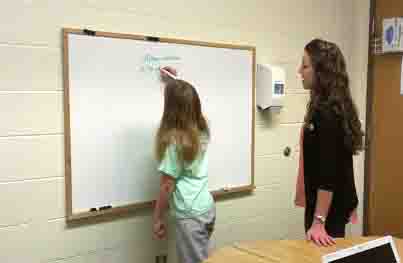One day at a time.
That is how Monica Meyer gets through her hectic days as a senior preparing to graduate while also taking 12 graduate program credits in communicative disorders.
In a typical day, Meyer starts her clinical placements at 6 a.m. and then has classes until 7:30 p.m. After three to four hours of lesson planning for her clinical case load, Meyer goes straight to sleep to get ready for the next day.
“It’s been a crazy year,” Meyer said. “I am a person who has to be organized. I have to know exactly what I’m doing the next day, and I can’t go into something without being completely prepared.”
In addition to hours of homework each night and being president of the National Student Speech Language Hearing Association, Meyer spends eight hours a week working cognitively disabilitied children and helping them improve their speech skills for her clinical placements.
“I have a different placement than I did last semester, and it was sad to leave the kids,” Meyer said. “I don’t think they always realize what’s going on, so when I told them I wasn’t going to be working with them anymore, they just said, ‘OK, bye!’ It’s sad, because I’m not going to see the progress they have made or really get to see them again.”
Monica also has worked with adults in a medical setting and said she is torn as to which group she would like to work with in the future. Although she feels comfortable with adults, she said she gets great satisfaction and has fun working with kids.
“It’s the coolest thing when parents and teachers come up to me and tell me I’m doing a great job or telling me their children are progressing,” Meyer said.
To add to her busy schedule last fall, Meyer also planned the Wisconsin Speech-Language Pathology and Audiology Association convention, an annual state-wide event. This was the first time UW-Whitewater hosted the event, and as the president of NSSLHA, Meyer was given the responsibility of organizing it with help from people in the Communication Sciences and Disorders Department.
Meyer organized 11 speakers from the Communication Sciences and Disorders profession to participate in the event and invited guests from universities all over Wisconsin to attend the convention. More than 70 people attended the event.
Although Meyer said the day went smoothly and everything “fell into place,” the months leading up to the event were stressful.
“Up until the day of the event, I was still freaking out, hoping everything was perfect, making sure the guest speakers would come and knew where they were going. It took a lot of time,” Meyer said. “I remember every day I would have 20 emails from people I had to respond to. It was pretty crazy, but it was worth it.”
Eileen Haebig, a third year Ph.D. student and WSHA student representative, said she nominated Meyer for a Student Leadership Award due to her professionalism and hard work in planning the event. Meyer was honored with the award at the state convention in March.
“She was very proactive and organized and very positive throughout the whole event,” Haebig said. “I thought she deserved to be recognized.”
Brenda Armstrong, office manager of the Communication Sciences and Disorders Department, has experience with event planning and helped Meyer with the behind-the-scenes work.
“I think Monica is really the stout in her people skills,” Armstrong said. “She works really hard, and she has a very high standard for what she expects of herself, and sets a precedent for people to follow.”
Although the stress of planning a state-wide convention is over, Meyer said she still has plenty to keep her busy as she gets into her graduate career.
“I’m finally getting more comfortable with accepting things as they come and dealing with it when I have to,” Meyer said. “I haven’t changed the way I am. It still bothers me that I’m not organized and that I can’t be prepared, but I just have to do it, just have to get through it, and it will get better.”


